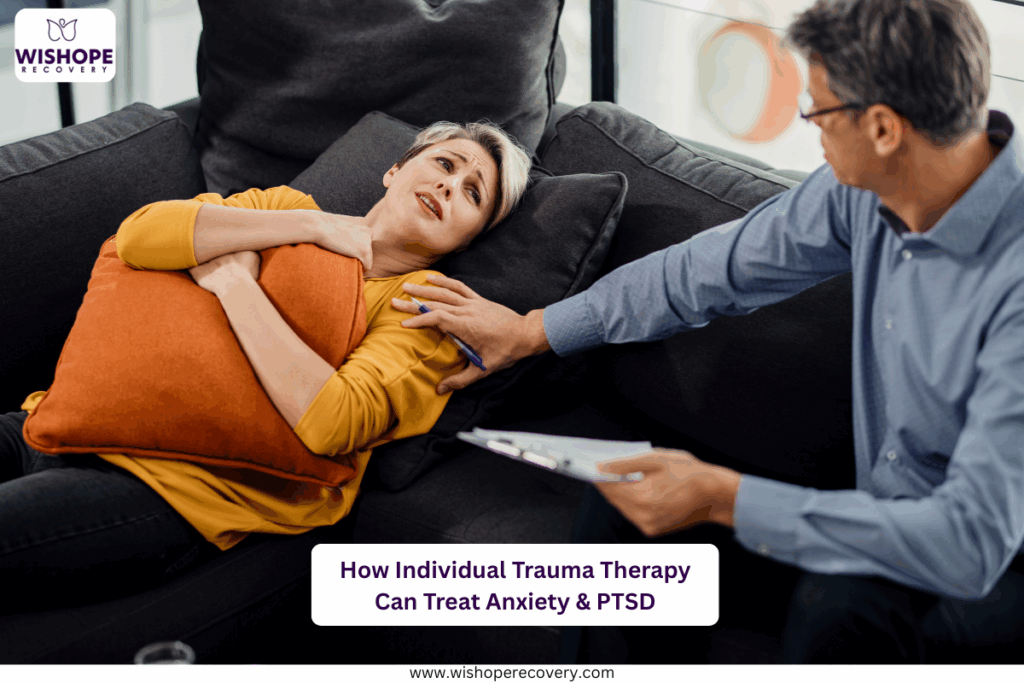Trauma can have long-lasting effects on mental health. It usually shows up as PTSD, anxiety, or other emotional problems. One-on-one trauma therapy is a successful and private healing approach. It helps people to process their experiences and regain control over their lives. In order to help adult and adolescent women deal with the complex symptoms of trauma, WisHope Recovery provides specialized trauma therapy.
What is Individual Trauma Therapy?
Individual trauma therapy is one type of one-to-one therapy designed to help individuals process and attain recovery from traumatic events. Just like group therapy would gnaw at a member’s boundaries, one-on-one therapy gives an individual the attention that they really need such that growing expert feel safe with exploring their feelings, memories, and responses without any bias. To foster healing, the therapist works with these proven techniques-they could be mindfulness, eye movement desensitization and reprocessing (EMDR), or cognitive-behavioral therapy (CBT).
Effects of Trauma on PTSD and Anxiety
Trauma could bring about long-lasting changes in the brain that influence the regulation of emotions and the stress response. PTSD and anxiety symptoms go hand in hand, including:
- Intrusive thoughts or flashbacks
- persistent anxiety or fear
- Sleep disorders and nightmares
- Emotional detachment or numbness
- Hypervigilance or heightened startle response
- Unless effectively managed, such symptoms may cause difficulty in daily living, relationships, and general quality of life.
Advantages of Individual Trauma Therapy for Anxiety & PTSD
- Safe and Confidential Setting: Members feel uninhibited to discuss highly personal matters without fear.
- The Treatment Plan Created: These techniques are programmed according to the personal trauma background, mental, and emotional health needs.
- Skill Development: The therapy teaches a person to recognize coping skills for those symptoms arising from anxiety, intrusive or unwanted thoughts, and triggers for PTSD.
- Emotional Regulation: How to regulate one’s emotional intensity effectively; control panic attacks or flashbacks.
- Empowerment: The client takes control again of thoughts, feelings, and behaviors and gains confidence in living daily life.

Therapeutic Approaches Used in Adult Trauma
- CBT: Helps identify pathways of unhealthy thinking and change them into appropriate positive responses.
- EMDR (Eye Movement Desensitization and Reprocessing): Helps the brain process traumatic memories and thus treat traumatization.
- Mindfulness and Relaxation Techniques: Provides anxiety reduction, fosters self-awareness, and supports better emotional regulation.
- Narrative Therapy: Helps the client restructure their traumatic narrative, leading to understanding and ability to cope.
Frequently Asked Questions
Q1: How long does individual trauma therapy take?
A: Depending on one’s level of traumatization and personal growth, time frame varies. Some clients get better in some months, and others need long-term therapy.
Q2: Can adolescent individuals receive therapy for personal traumatization?
A: Yes. Adolescents would highly benefit from one-to-one trauma therapy as it is a safe environment where they would process emotions and learn coping exercises.
Q3: Will traumatic therapy reduce my anxiety if I don’t have PTSD diagnosis?
A: Yes. The treatment for traumatic disorders targets symptoms of anxiety for previous exposure to traumatic stress without consideration for diagnosis with PTSD.
Q4: Will I have to discuss my traumatic event in detail?
A: You’re guided by therapists at your own speed. Choose how much to reveal, for therapy is about getting better and coping-not rehashing the tragedy.
Q5: What is the difference between individual therapy and group therapy?
A: Individual therapy provides personal attention on a one-to-one basis with treatment regimes tailored specifically for the individual, while group therapy offers support from peers who share an understanding. They complement one another.
Final Thoughts:-
Durable Individual trauma therapy is also a highly effective method of helping to alleviate PTSD and anxiety. Through one-to-one support and coping skills, individuals are able to transition from residual traumatic stress. At WisHope Recovery, our skilled therapists are here to help along the path to mental health and resiliency.

